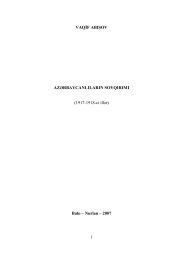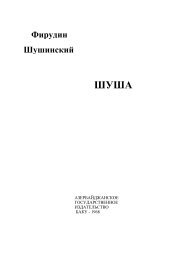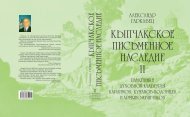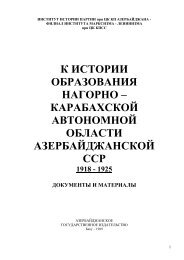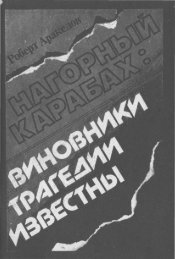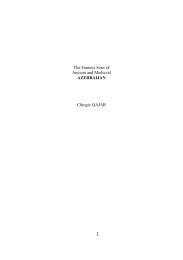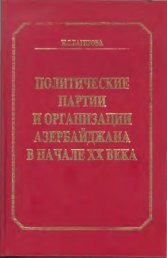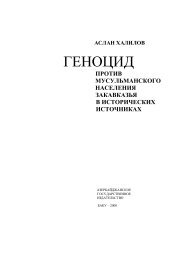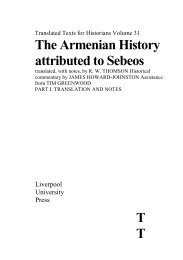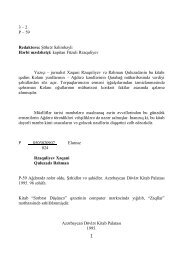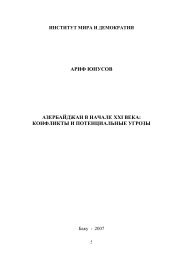ARMENIAN - Erevangala500
ARMENIAN - Erevangala500
ARMENIAN - Erevangala500
Create successful ePaper yourself
Turn your PDF publications into a flip-book with our unique Google optimized e-Paper software.
A Personal Foreword<br />
"Have you gone crazy?" - "Are you tired of living?"<br />
These were the comments of friends and acquaintances<br />
when they heard that I was working on a book about the<br />
causes and historical context of Armenian terrorism. Why<br />
should / be the one to take on such a dangerous subject?<br />
. . . Shouldn't it be a matter for the Turks and Armenians<br />
to work out among themselves? All of my friends considered<br />
my project dangerous, even threatening, and I realized<br />
that it must be these concerns, these fears, that have<br />
until now prevented unbiased accounts of the historical<br />
reality behind Armenian terrorism from appearing.<br />
People are obviously afraid of reprisals and therefore<br />
leave the whole issue to the advocates of reckless violence,<br />
who control virtually all the literature on the subject.<br />
In virtually every publication that discusses the<br />
Armenian question or Armenian terrorism, the authors<br />
plead for "understanding" toward terror. This is just as<br />
remarkable as when terrorist organizations claim "responsibility"<br />
after an attack.<br />
With this "responsibility" - or rather with the perversion<br />
of this noble concept - they pretend to have "power" by<br />
creating the illusion o f "justice", and with this legitimation<br />
they play fate, shoot down the reluctant and blackmail<br />
the hesitant.<br />
It is not only human beings who have fates, however, but<br />
films and publications as well. HABENT SUA FATA<br />
LIBELLI, "books have fates", wrote Terentianus Maurus<br />
around 200 A.D., and in the preceeding verse he says resolutely,<br />
"PRO CAPTU LECTORIS", "according to the<br />
grasp of the reader".<br />
I had two key experiences in this connection following<br />
the appearance of the German edition of this book. The<br />
first was with a very high official of the Annenian<br />
Orthodox (Gregorian) Church of Central Europe who, in<br />
the course o f a meeting with the (Catholic) Mekhitarists<br />
(who truly have nothing to do with this statement), said to<br />
my face, "How dare you set the worthless Turks off<br />
against the dead Armenians in your book!" When 1 asked<br />
in honor if I had understood correctly, he repeated even<br />
more vehemently, "Yes, I said the worthless Turks!"<br />
The Armenian view of history is for the most part shared<br />
by the public at large. That is no surprise, and it should<br />
not be taken as a reproach.<br />
While doing the background research for this book and<br />
for my films, I took great pains to collect information<br />
from a broad spectrum o f sources. In so doing, I met<br />
many people to whom I owe the deepest respect: His<br />
Beatitude the Armenian Apostolic Patriarch Snork<br />
Kalutsyan of Istanbul, for example, and the doctors and<br />
nurses of the Armenian hospital in the same city. I mention<br />
these people here in lieu of the many, many noble<br />
Armenians whom I know - from scholars and intellectuals<br />
to the Armenian farmers and their families who live<br />
on Musa Dagh, made famous by Franz Werfel. I did, of<br />
course, also meet other people in the course o f my<br />
research work. I especially recall Dr. Gerard Libari-dian,<br />
the head of the Annenian Zorian Institute. I spent several<br />
hours with Dr. Libaridian in his .office in Cambridge,<br />
Massachusetts and had an extremely interesting conversation<br />
with him. Dr. Libaridian is a brilliant man, bubbling<br />
with vitality, knowledge, talent, and self-confidence.<br />
One could write a very compelling play based on<br />
my conversation with him.<br />
I kept notes of my host's most provocative statements in<br />
this fascinating discussion. Several times he mentioned<br />
the so-called "Andonian papers".<br />
Since it seemed reasonable to assume that Dr. Libaridian<br />
knew that the papers were forgeries, 1 did not want to<br />
waste a single word on the subject. There were so many<br />
other, more interesting things to talk about. But remarkably<br />
enough, he stuck with Aram Andonian's book and its<br />
"documents". Finally, I had to say, "But Doctor Libaridian,<br />
you know as well as I that tbese 'Andonian papers'<br />
are forgeries!"<br />
I will never forget Dr. Libaridian's answer or his facial<br />
expression as he replied simply and briefly to my reproach:<br />
"AND?"<br />
KHOJALI GENOCIDE commited<br />
by Armenia in 26 February 1992.<br />
"AND?"<br />
7



